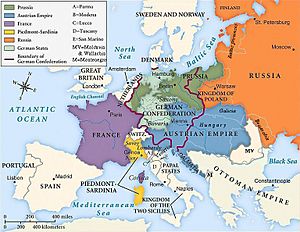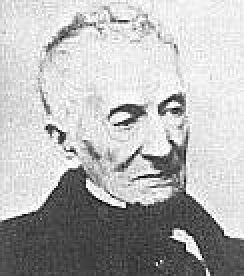Concert of Europe facts for kids
| 1815–1849 | |

The national boundaries within Europe as set by the Congress of Vienna, 1815.
|
|
| Preceded by | Napoleonic era |
|---|---|
| Including |
|
| Followed by | Romantic era |
| Leader(s) | |
The Concert of Europe was like a special club of powerful European countries. They worked together to keep peace after the big Napoleonic Wars ended in 1815. It was also called the Congress System or the Vienna System, named after the important Congress of Vienna meeting.
The main goal of this group was to stop new wars and prevent any one country from becoming too strong. They wanted to keep things balanced across Europe. They also tried to stop revolutionary ideas from spreading. The main countries in this group were the United Kingdom, Austria, Russia, and Prussia. After Napoleon was defeated, France also joined the Concert of Europe.
Contents
What Was the Concert of Europe?
The Concert of Europe was a way for leaders to solve problems together. Instead of fighting, they would meet and talk things out. They made decisions by agreeing with each other. This system helped Europe stay mostly peaceful for a few decades.
The Concert started operating right after the Napoleonic Wars in 1815. It was most active until the early 1820s. Some historians believe it played a role even until the Crimean War (1853–1856). Later on, this idea of countries working together evolved into groups like The League of Nations.
Key Leaders of the Concert

Many important leaders helped guide the Concert of Europe. They met often to discuss Europe's future. Some of the most influential leaders included:
- Lord Castlereagh - He was the Foreign Secretary for Britain.
- Prince Klemens von Metternich - He was the Chancellor of Austria. Metternich was very important in shaping the Concert's ideas.
- Alexander I - He was the Czar (ruler) of Russia.
Why Was the Concert Formed?
The Concert of Europe had several important goals after the long years of war caused by Napoleon. These goals helped shape Europe for many years:
- Control France: After Napoleon's defeat, the other countries wanted to make sure France wouldn't start another big war.
- Balance of Power: They wanted to create a "balance of power." This means making sure no single country in Europe became too powerful. If one country got too strong, it could threaten others.
- Uphold Agreements: They aimed to stick to the agreements made at the Congress of Vienna (1814-1815). These agreements redrew the map of Europe and set new rules.
- Prevent Dictators: The leaders wanted to stop another powerful dictator, like Napoleon, from rising up and taking over.
What Did the Concert Achieve?
The Concert of Europe had some good results:
- It helped Greece gain its independence.
- It also helped Belgium become an independent country.
- The Concert played a part in ending Egypt's control over Syria. This control had lasted for eight years.
Why Did the Concert End?
Over time, the Concert of Europe started to fall apart. The countries began to disagree more and more. The main disagreements were often between Great Britain (England) and the other more traditional countries in the Concert.
The Concert finally ended after several major wars broke out in Europe:
- The Crimean War
- The Italian War for Independence
- The Austro-Prussian War
- The Franco-Prussian War
These conflicts showed that the countries could no longer work together to keep the peace.
Images for kids
-
Prince Metternich, Austrian chancellor and foreign minister, as well as an influential leader in the Concert of Europe
See also
 In Spanish: Concierto europeo para niños
In Spanish: Concierto europeo para niños


